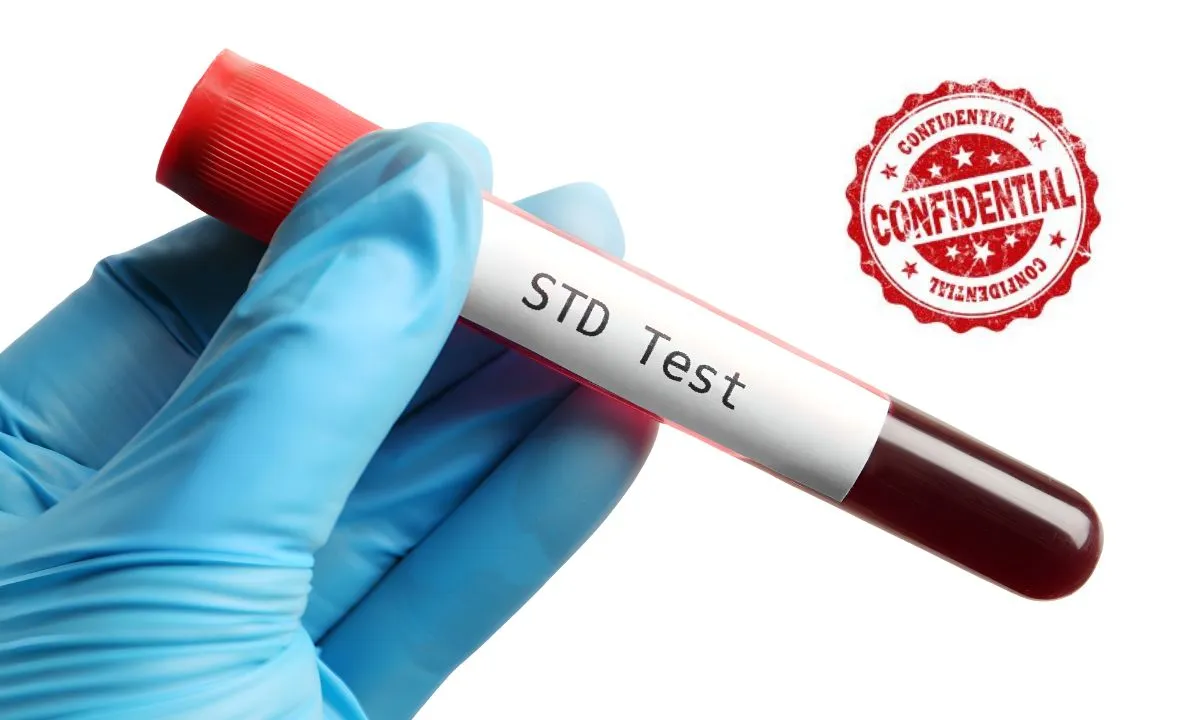
Getting tested for sexually transmitted diseases (STDs) is incredibly important for the health of individuals and their partners. Many people don’t realize they are at risk for STDs or put off getting tested out of fear or embarrassment. However, confidential STD testing options are available and can ensure you stay healthy.
STDs like chlamydia, gonorrhea, hepatitis B, HIV, syphilis, and others can have severe consequences if left untreated. They increase the risk for complications such as infertility, cancer, neurological damage, and can be transmitted to partners. Thankfully, STD testing is a quick and easy way to detect infections early so you can get treated right away.
While it may seem daunting to get tested, you can have total peace of mind knowing your results will remain private. Confidential STD testing centers provide a safe, discreet way to find out your status without judgment. They understand how sensitive this topic can be and make your comfort a top priority. You can even get fast results within 1-2 days at many confidential testing sites.
Getting STD tested regularly is crucial for protecting your health and your partner’s health. Don’t let fear or stigma get in the way. Read on to learn all about the private and painless STD testing options available to help you make the best decisions for yourself and your partner.
Related: STDcheck.com Review: Confidential Testing & Fast Results (2024 Update)
Confidential vs. Anonymous STD Testing
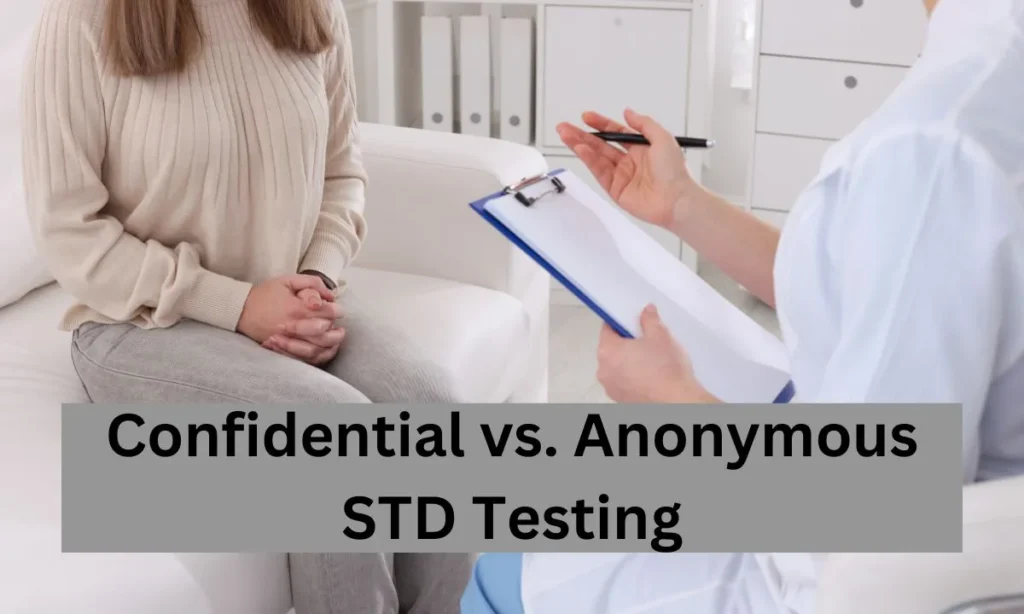
The main difference between confidential and anonymous STD testing is how your personal information is handled.
With confidential testing, you provide your real name and contact details to the testing provider. This allows them to keep your test results private but still link the results back to you. The clinic maintains confidentiality by not sharing your information without your consent.
Anonymous testing does not require you to disclose any personal or contact information. You will be assigned a unique code or ID number to link to your test results. Since there is no name attached, your results remain completely anonymous.
Some key differences:
- Confidential testing – Provide real name and details, clinic maintains privacy
- Anonymous testing – No personal details required, given a code/ID for results
The level of privacy needed may depend on your situation. Confidential testing gives you access to your results for any necessary treatment. Anonymous testing may be preferred if you want to get tested 100% privately without any linkage back to your identity.
Both confidential and anonymous testing options provide discretion from having your STD status disclosed publicly. But confidential testing offers the advantage of clinicians being able to follow up with you about any positive test result.
Related: Anal STDs During Pregnancy: Symptoms You Can’t Afford to Miss
Benefits of Confidential STD Testing Options
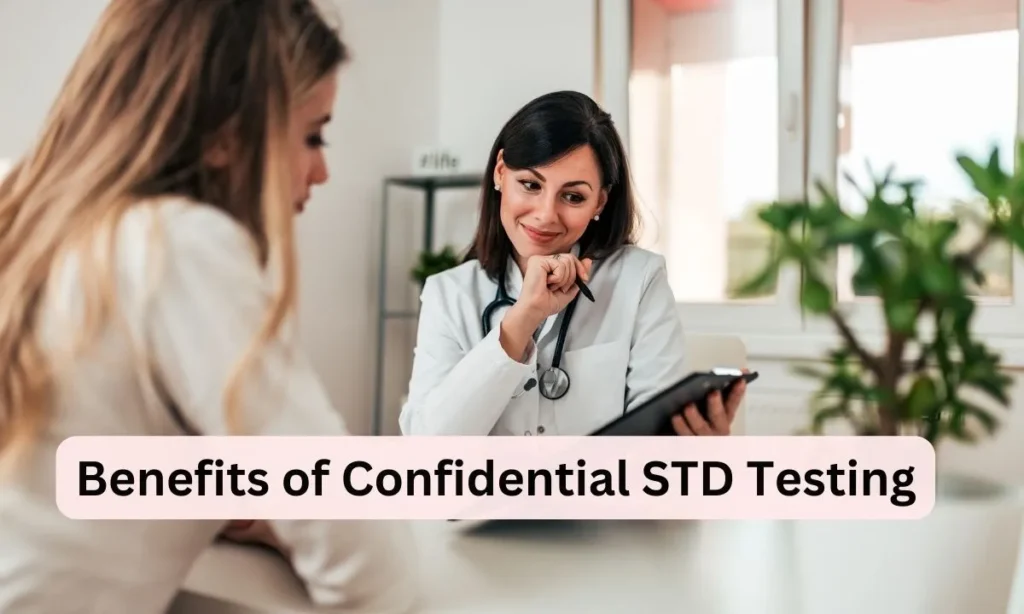
Confidential STD testing offers several advantages compared to standard testing through a primary care provider or insurance. The main benefits include:
Avoiding Insurance Records
With confidential testing, you can avoid having STD tests show up in your insurance records. Many people want to keep their sexual health private and prefer their insurer does not have access to this info. Confidential clinics do not bill insurance and allow you to pay out-of-pocket for tests.
Privacy
Confidential STD testing centers make privacy a top priority. Your name will not be shared with any third parties, and your test results are kept confidential in accordance with the law. You don’t have to worry about friends or family finding out.
Convenience
You can walk into a confidential clinic without an appointment and get fast STD testing. Many provide results within 1-3 days so you don’t have to wait long. Confidential clinics also offer evening and weekend hours to fit different schedules. You don’t need a referral from your primary doctor.
Expertise
Confidential STD testing centers specialize in sexual health screenings. Their staff have expertise in testing procedures, counseling, and connecting patients to appropriate treatment. You can get answers to any questions.
Anonymity
While confidential testing keeps your name private, anonymous testing does not even record your name with your samples or results. This option may be available at some confidential clinics. You provide no identifying information.
Confidential STD testing provides multiple advantages over standard testing methods for those who value privacy and convenience. Taking control of your sexual health begins with informed choices.
Additional Tips: 1. Schedule an appointment: This will help you avoid having to wait in a crowded waiting room. 2. Let the clinic know you prefer confidentiality: Most clinics will be happy to accommodate your request. 3. Use a pseudonym when possible: Some clinics allow you to use a pseudonym when scheduling an appointment or picking up your results. 4. Be aware of your surroundings: When getting tested at a clinic, be mindful of who is around you and what information you share out loud.
Related: 24 Must-Have Pregnancy Apps To Download During Pregnancy
Types of STDs to Test For
There are many different sexually transmitted diseases (STDs) that you can get tested for confidentially. Some of the most common STDs include:
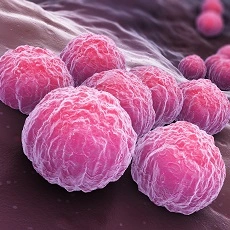
Chlamydia – This is one of the most common STDs. It often doesn’t cause symptoms, which is why testing is important. If left untreated, it can lead to infertility and other health issues.

Gonorrhea – Another very common bacterial STD. Like chlamydia, it frequently causes no symptoms. If untreated, it can result in infertility and other complications.

HIV – The virus that causes AIDS. Early diagnosis is critical for managing the infection and preventing transmission.

Syphilis – This bacterial STD can cause various complications if left untreated, including neurological damage and organ damage.
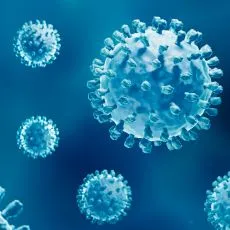
Hepatitis B – A viral liver infection that can become chronic. Testing is crucial, especially for pregnant individuals.
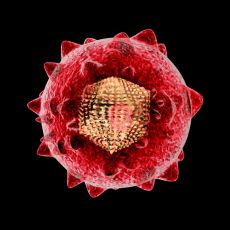
Hepatitis C – Another viral liver infection that can lead to chronic liver disease if left untreated. Screening is recommended for everyone.
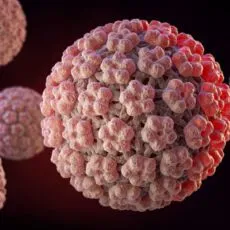
HPV – The human papillomavirus can cause genital warts and lead to various cancers. Vaccination is recommended for prevention.

Herpes – Genital herpes is very common and can cause painful sores. Antiviral medication can help manage symptoms.
Confidential testing for all of these STDs and more is available to provide individuals with vital information about their health. Early detection can allow for prompt treatment to prevent transmission and complications.
Related: How To Do A parasite cleanse during pregnancy
Where to Get Tested

There are a few convenient options for getting confidential STD testing:
Doctor’s Office
This is often the most convenient option, and most doctors include STD testing as part of routine checkups. You can request a private conversation with your doctor to discuss your concerns about confidentiality
Clinic or Health Center
Visiting a community health clinic or local health center are popular choices for confidential STD testing. These facilities specialize in sexual health services and make privacy a top priority. Many clinics offer free or low-cost testing depending on your income and insurance coverage. You don’t need an appointment at most clinics so you can walk in and get tested anonymously.
Planned Parenthood
Planned Parenthood clinics offer confidential and affordable STD testing and treatment. They are experts in sexual health and can provide a safe and judgment-free environment.
At-Home Test Kits
If privacy is your main concern, opting for an at-home STD test kit may be the best solution. Companies such as Lets Get Checked, everlywell, myLABBOX, NURX, etc, offer discreet shipping and online results for a variety of STDs. You simply order the test online, collect your sample at home, ship it back to the lab, and view your results securely online a few days later. At-home kits provide maximum convenience and confidentiality.
Additional Tips: 1. If you have health insurance, check your plan to see if it covers at-home STD tests. 2. Without insurance, kits can cost as low as $10 and go up to $250. 3. Many Planned Parenthood health centers offer free or low-cost at-home STD tests based on income.
Related: Home Pregnancy Test Versus Blood Test: Taking the Guesswork Out
What to Expect During Testing

When you go for confidential STD testing, you can expect the process to be discreet and professional. Here’s an overview of what the testing appointment may entail:
Blood Draw
The provider will likely draw a sample of your blood to test for various infections. You may feel a small pinch when the needle goes in, but the blood draw only takes a few seconds.
Urine Sample
You’ll also need to provide a urine sample, which can be tested for common STDs.
Oral Swab or Pelvic Exam
Depending on the tests being conducted, you may also need an oral swab or pelvic exam.
Having an idea of what to expect can make the confidential STD testing process less intimidating. The testing is ultimately quick and straightforward. And remember – the provider performs these tests every day, so there’s no need to feel embarrassed. The most important thing is taking care of your health.
Related: The Top 5 Home Pregnancy Test Kits in India – 2024
Getting Test Results
Getting the results from STD testing can cause anxiety, especially if you’re worried about testing positive. However, try to stay calm and remember that the sooner you find out, the sooner you can get treatment if needed.
After your samples are collected, they are sent to a lab for analysis. Most STD test results come back within a few days. The testing center or doctor’s office will contact you when results are ready, either by phone, mail, or secure online patient portal.
If any tests come back positive, your doctor will explain what it means and what treatment options are available. Try not to panic – many STDs are treatable, especially when caught early. The doctor will help create a treatment plan, which may include prescription antibiotics or antiviral medications.
It’s crucial to follow your doctor’s advice and take all medications as prescribed. You should avoid sexual contact until treatment is complete and you test negative. Your partner(s) will also need to be notified and tested.
While waiting for test results can be stressful, try to stay optimistic. Getting tested shows you care about your health. And seeking prompt treatment will allow you to get back to your normal routine as quickly as possible.
Related: Isibloom Birth Control – That’s Affordable and Convenient
Importance of Treatment
Getting treated for an STD as soon as possible is crucial to prevent complications and long-term health effects. Many STDs can be cured with the right medications, while others can be managed with ongoing treatment.
Some of the potential complications of untreated STDs include infertility, cancer, neurological damage, and organ damage.
The good news is that most STDs are treatable, especially when detected early through testing. By starting treatment promptly, you can avoid severe complications. Certain incurable STDs like herpes and HIV can be managed with medications as well.
Getting tested regularly and starting treatment as soon as possible allows you to take control of your health. Don’t delay if you have symptoms or have been exposed to an STD – seek medical care right away. With the right medications, most STDs can be cured or controlled before they cause lasting damage.
Related: Errin Birth Control: Your Questions Answered
Talking to Your Partner
Discussing STD testing with a partner can be an awkward conversation, but an important one. Here are some tips for bringing up the topic:
Be honest and transparent. Let your partner know you care about them and want to make sure you’re both healthy. Explain why testing is important to you.
Pick a good time to talk. Bring it up during a calm moment when you can have an open discussion.
Come from a place of care, not accusation. Make it clear you’re not accusing them of anything, you just want to be responsible.
Suggest testing together. Offer to go with them to get tested.
Talk about sexual history. Be open about your own history too.
Discuss next steps. If testing positive, assure them you’ll be supportive and work through it together.
Listen to their concerns. Hear them out and address their concerns calmly and kindly.
Focus on the relationship. Explain that testing will make your relationship stronger by building trust and peace of mind.
Be positive. Remind them that most tests come back negative. Frame testing as taking care of your health and your relationship.
Approaching the conversation with empathy, honesty, and care for your partner can go a long way. STD testing is an important part of a healthy relationship.
Related: Can You Take 2 Birth Control Pills In One Day?
Takeaway
Getting tested for STDs can feel daunting, but it is an incredibly important part of taking care of your sexual health. This article covered the main benefits of seeking confidential STD testing, including:
- Avoiding the greater complications that can occur when STDs go untreated
- Having peace of mind about your status
- Being able to get treatment quickly if you do test positive
- Protecting your partner by not passing anything on unknowingly
The testing process itself is often quick and straightforward – a far cry from the anxiety we often build up in our heads. And your results will remain private.
While there is no shame in having an STD, we understand the desire for privacy around your sexual health. Confidential testing centers make this possible.
If you suspect you may have been exposed to an STD, please don’t delay. Reach out to a local confidential testing center to take control of your health. The few minutes of discomfort during the test will be worth it for gaining the knowledge you need to take care of yourself and your partner.
Related: Pregnancy Gas Pains VS. Contractions
Private Testing Made Simple for Expecting Moms
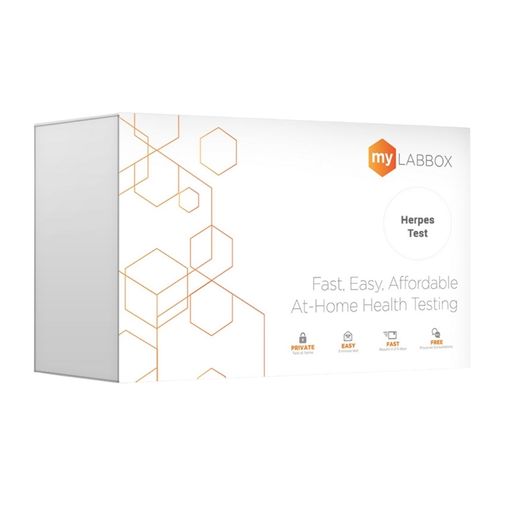
Frequently Asked Questions (FAQs)
u003cstrongu003eWho Should Consider Confidential STD Testing?u003c/strongu003e
Anyone who is sexually active should consider getting tested for STDs regularly. This is especially important if you:u003cbru003eu003cstrongu003e1. Have a New Sexual Partner:u003c/strongu003e Starting a new relationship means increased risk, and confidential testing offers peace of mind.u003cbru003eu003cstrongu003e2. Have Multiple Sexual Partners:u003c/strongu003e The more partners you have, the greater the chance of exposure. Confidential testing helps you stay informed.u003cbru003eu003cstrongu003e3. Do Not Consistently Use Condoms or Other Barrier Methods:u003c/strongu003e Barrier methods reduce risk, but aren’t foolproof. Confidential testing provides an extra layer of security.u003cbru003eu003cstrongu003e4. Have a History of STDs:u003c/strongu003e A previous STD increases your susceptibility to future infections. Confidential testing allows for early detection and treatment.
u003cstrongu003eWhat Are the Risks of Untreated STDs?u003c/strongu003e
Untreated STDs can lead to a variety of serious health problems, including:u003cbru003eu003cstrongu003e1.u003c/strongu003e u003cstrongu003ePelvic Inflammatory Disease (PID) in Women:u003c/strongu003e This can cause infertility and chronic pain. Early detection through confidential testing allows for prompt treatment and reduces these risks.u003cbru003eu003cstrongu003e2. Increased Risk of Certain Cancers:u003c/strongu003e Confidential testing helps identify STDs that can put you at higher risk for certain cancers, allowing for preventative measures.u003cbru003eu003cstrongu003e3. Ectopic Pregnancy:u003c/strongu003e This is a pregnancy that occurs outside the uterus and can be life-threatening. Confidential testing helps identify STDs that can increase the risk of ectopic pregnancy.u003cbru003eu003cstrongu003e4. Birth Defects in Newborns:u003c/strongu003e Some STDs can cause serious birth defects. Confidential testing during pregnancy protects your baby’s health.
u003cstrongu003eCan I Get Free STD Testing If I’m Uninsuredu003c/strongu003e?
Yes! Many public health clinics offer free or low-cost STD testing. You can find a clinic near you by searching online or contacting your local health department. Confidential testing is available regardless of your insurance status.
u003cstrongu003eHo2 To Talk to My Doctor About STD Testing?u003c/strongu003e
Talking to your doctor about STD testing can feel awkward, but it’s an important conversation to have. Here are some tips:u003cbru003eu003cstrongu003e1. Start by Explaining Why You’re Concerned:u003c/strongu003e Let your doctor know that you’re interested in getting tested for STDs as a part of your routine sexual health check-up.u003cbru003eu003cstrongu003e2. Focus on Prevention:u003c/strongu003e Frame STD testing as a way to maintain good health and prevent future problems.u003cbru003eu003cstrongu003e3. Ask Questions:u003c/strongu003e Don’t be afraid to ask your doctor about specific tests, what the results mean, and what treatment options are available. Confidential testing empowers you to take control of your health.
u003cstrongu003eWill My Partner Need to Be Tested for STDs If I Test Positive?u003c/strongu003e
It is highly recommended that your partner(s) also get tested for STDs if you test positive. This can help prevent them from spreading the infection to others and ensure they receive any necessary treatment. Your doctor can discuss the best way to approach this conversation with your partner(s). Confidential testing protects not just you, but also your partners.












